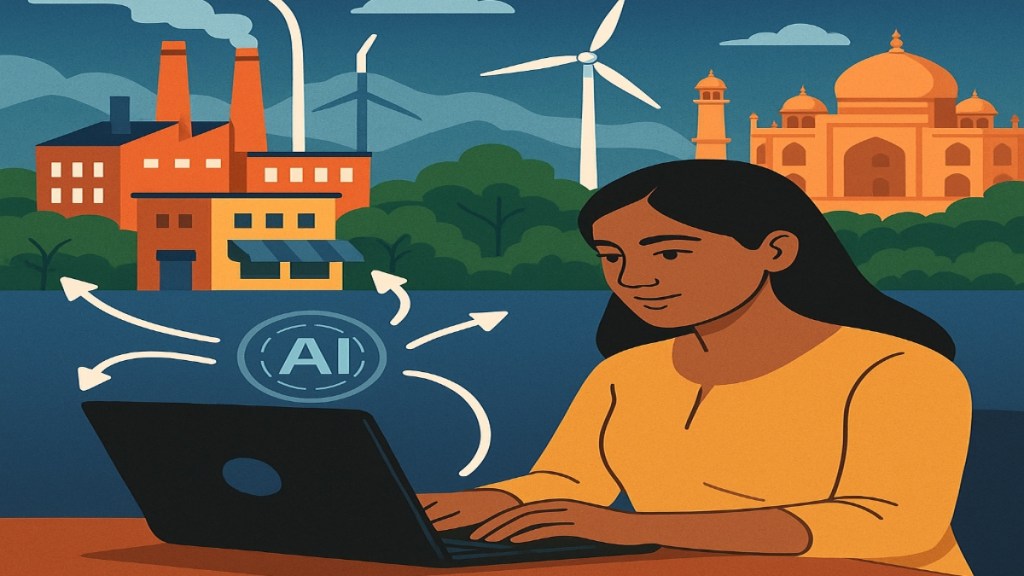Amid global economic uncertainty, India is emerging as a beacon of resilience and innovation. With a thriving start-up ecosystem, a digitally savvy population, and robust public-private partnerships, the country is on a trajectory to outpace major economies.
What makes this growth even more promising is the transformative role artificial intelligence (AI) is playing, especially in tier 2 and 3 cities, where it’s driving inclusion, improving access to services, and reshaping local economies.
While the impact of AI is both wide and deep, today we will look into just a few areas where it is starting to make an impact, and as a result, contributing to India’s economic resurgence.
Agricultural and dairy transformation
AI is revolutionising agriculture in India by providing smallholder farmers with precision farming tools and real-time data. Platforms like Stellapps are embedding AI and IoT (Internet of Things) across the dairy supply chain—from livestock health monitoring to milk quality control and logistics. In tier 2 and 3 cities like Varanasi, Indore, and Patna, AI-powered tools such as the mooON wearable for cattle and smartAMCU for milk collection are improving productivity, ensuring traceability, and enhancing farmer income.
“AI is not replacing farmers—it’s empowering them,” says Ranjith Mukunda, CEO of Stellapps. “In Varanasi, we’ve seen up to a 500 per cent improvement in profitability and a 160 per cent higher market realisation for milk.” The company’s innovations, including AI-driven credit scoring through mooScore, are also fostering financial inclusion for farmers who were previously unbanked.
But dairy farming isn’t the only sector getting a tech makeover. In classrooms and job markets, AI is changing the game for India’s youth.
Redefining skill development and employment
AI is helping bridge the urban-rural skill gap by making education and training more accessible and demand-driven. Adaptive learning platforms and virtual apprenticeships are equipping youth with relevant skills.
“Cities such as Indore (with AI-enabled Global Capability Centers), Meerut (precision agriculture), Jalandhar (AI-led quality control in sports and textile manufacturing), and Jaipur (retail and logistics-focused AI hubs) seeing the emergence of AI-enabled employment ecosystems,” says Amit Singh Khokhar, Assistant Professor at Delhi Skill and Entrepreneurship University.
Institutions like IndiaAI FutureSkills and NIELIT are setting up AI and data labs in cities such as Gorakhpur and Bikaner, further democratising access to digital skills. From AI-assisted customer support to predictive maintenance, Tier 2 and 3 cities are fast becoming talent hubs for MSMEs and new-age industries.
Democratising education
EdTech platforms are leveraging AI to personalise learning, offering real-time feedback and tailored content to learners across India’s smaller towns.
Akshal Agarwal, Co-Founder of NatureNurture, which works across 75 tier 2 and 3 cities, notes how AI-based education is removing geographic and economic barriers.
“A young girl in a small town no longer has to choose between caring for her parents and pursuing a startup,” he says. “AI is a decentralising opportunity, enabling local talent to thrive without migrating to metro cities.”
Driving job inclusion with AI recruitment
Traditional hiring often overlooks talent in smaller cities. AI-based recruitment platforms like CoHyre.ai are helping change that. “Tier 2 and 3 towns are full of capable individuals who struggle due to geography, infrastructure, and unconscious bias,” says Deepak Ahluwalia, CoHyre’s CEO. “Agentic AI tools now match candidates with jobs based on actual skills, intent, and learning agility—not just CVs.” This approach not only ensures fairer hiring practices but also boosts local economies by increasing job opportunities and reducing urban migration.
Empowering vulnerable groups
NGOs like SOS Children’s Villages India are integrating AI into skilling initiatives for vulnerable communities. In 2024–25, they trained nearly 3,000 youth in cities like Rourkela, Guwahati, and Bhimtal.
“AI enables personalised learning paths and helps connect youth to social benefits and job-readiness training,” says CEO Sumanta Kar. Many of their alumni now work in sectors like IT, healthcare, and hospitality, or have launched their own ventures.
As India moves toward its $5 trillion economic vision, AI is proving to be a powerful tool for inclusive development. From precision farming and AI-driven hiring to smart education and financial inclusion, Tier 2 and 3 cities are emerging as engines of India’s digital economy. With over 500 million smartphone users and the world’s largest Gen Z population, India holds immense potential for grassroots innovation powered by technology.

